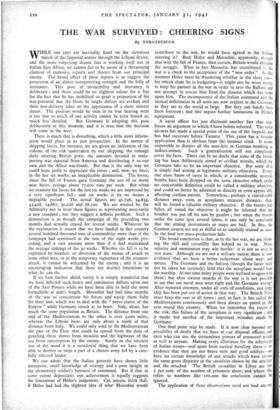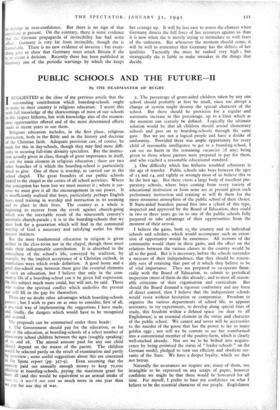THE WAR SURVEYED: CHEERING SIGNS
By STRATEGICUS
WHILE our eyes are inevitably fixed on the victorious march of the Imperial armies through the Libyan desert, and the more surprising drama that is working itself out in Italian East Africa, we cannot fail to be aware of a threatening clamour of rumours, reports and threats from our principal enemy. The broad effect of these reports is to suggest the possession of an almost overpowering strength and the folly of resistance. This pose of invincibility and inerrancy is • deliberate ; and there could be no .slightest colour for it but for the fact that he has mobilised so great a proportion of his war-potential that the blows he might deliver are evident and their non-delivery takes on the appearance of a more sinister threat. The position would be seen in its true bearing were • it not that so much of our activity cannot be even hinted at, much less detailed. But Germany is adopting this pose deliberately at this moment, and it is true that the decision will come in the west.
There is much that is disturbing, which a little more inform- ation would place in its just perspective. In the matter of shipping losses, for instance, we are given no indication of the volume of the risk undertaken by our shipping, the tonnage daily entering British ports, the amounts devoted to trans- porting war material from America and distributing it to our own and the Allied war-fronts. But that is the only way we could hope .justly to appreciate the losses ; and, now, we have, in the last six weeks, an inexplicable diminution. The losses, since the fall of France gave Germany the use of so many near bases, average about 77,000 tons per week. But when we examine the losses for the last six weeks we are impressed by a very significant fall ; and six weeks is by no means a negligible period. The actual figures are 41,746, 54,834, 43,428, 14,687, 30,226 and 58,100. We are warned by the Admiralty not to treat these figures as representing necessarily a new standard ; but they suggest a definite problem. Such a diminution is as though the campaign of the preceding two months had actually ceased for several weeks. Whatever be the explanation it means that we have landed in this country several hundred thousand tons of commodities more than if the campaign had continued at the rate of the eight weeks pre- ceding, and a vast amount more than if it had maintained the average sinkings of the 30 weeks. Whether the fall is to be explained by weather, or diversion of the means of attack to some other area, or to the temporary supremacy of the counter- attack, it cannot be welcomed by the enemy ; and it is an encouraging indication that there are distinct limitations to what he can do.
If we look farther afield, surely it is simply wonderful that we have inflicted such heavy and continuous defeats upon one of the Axis Powers while we have been able to hold the more formidable at arm's length. Mussolini had had nine months of the war to concentrate his forces and equip them fully for their task, which was to deal with the "nerve-centre of the Empire" while Germany struck at its heart. Italy, alone, has much the same population as Britain. The distance from one end of the Mediterranean to the other is over 2,000 miles, whereas the Libyan bases are only about a tenth of that distance from Italy. We could only send to the Mediterranean the part of the Fleet that could be spared from the duty of guarding these shores from invasion and the highways of the sea from interruption by the enemy. Surely in the strictest use of the word it is a wonderful thing that we have been able to destroy so large a part of a chosen army led by a care- fully selected leader.
We can admit that the Italian generals have shown little enterprise, small knowledge of strategy and a poor insight in the elementary soldier's business of command. But if that to some extent depreciates our achievement it equally suggests the limitations of Hitler's judgement. Can anyone think thit, if Hitler had had the slightest idea of what Mussolini would contribute to the war, he would have agreed to the Italians entering it? Both Hitler and Mussolini, apparently, thought that with the fall of France, then certain, Britain would abandon the struggle. What in fact Mussolini has contributed to the war is a check to the acceptance of the "new order." At this moment Hitler must be wondering whether in the short run— for which alone he is budgeting—it might not be wiser merely to keep his partner in the war in order to save the Balkans and not attempt to rescue him from the disaster which has come upon him. The incompetence of the Italian command and the tactical deficiencies in all arms are now evident to the Germans, as they are to the world at large. But they can hardly hay: been foreseen ; and this argues further limitations in Hitler's equipment.
A naval officer has just disclosed another fact that rein- forces an argument to which I have before referred. The naval air-arm has made a special point of the use of the torpedo, and has had successes before Taranto. This point has a broader application than is obvious from the instance cited. It seems impossible to dismiss all the near-hits in German bombing as indiscriminate. Such a generalisation will not completely cover the facts. There can be no doubt that some of the bomb- ing has been deliberately aimed at civilian morale, which the Germans take to be an important objective. But some of it is simply bad aiming at legitimate military objectives. Every- one must know of cases in which, at a considerable interval, bombs have been dropped on the same objective which under no conceivable definition could be called a military objective, and could no better be admitted as directly or even appreeably affecting civilian morale. Somewhere, perhaps a considerable distance away, even as aeroplanes measure distance, there will be found a valuable military objective. If the bombs had fallen all round the objective it might be inferred that the bomber was put off his aim by gunfire ; but when the bombs strike the same spot several times, it can only be concluded that the aiming instruments or maps are bad. In fine, the German airmen are not as skilful or as carefully trained as ours. In the final test mass-production fails.
The broad conclusion is that, as in the last war, we are show- ing the skill and versatility that helped us to win. Mass, velocity and momentum may win battles: it is not so easy to win wars. Although we are not a military nation there is now evidence that we have a better judgement about ways and means. The Germans and the Italians (though the latter need not be taken too seriously) held that the aeroplane would beat the warship. At one time many people were inclined to agree with them ; but after sixteen months of the war is it not possible to say that our naval men were right and the Germans wrong? After repeated attempts, under all sorts of conditions, one large ship has been put out of action in that way. The British Navy must keep the seas at all times ; and, in fact, it has ,sailed the Mediterranean continuously and been always on patrol in the seas round this country. When we remember the extent of the risk, this failure of the aeroplane is very significant ; and it marks but another of the important mistakes made by Germany.
One final point may be made. It is now clear beyond any possibility of doubt that we have at cur disposal officers and men who can use the tremendous powers of armoured attack as well as anyone. Making every allowance for the inferiority of Italian troops—and apart from tactical handling there is no evidence that they are not brave men and good so/diers—We have no certain knowledge of any attacks which have shown the same gross disparity in the casualties shown by the attacker and the attacked The British casualties in Libya are not 2 per cent. of the number of prisoners alone, and where this refers to numbers like roo,000 the conclusion cannot be ignored. The application of these observations need not lead anyone to indulge in over-confidence. But there is no sign of that anywhere at present. On the contrary, there is some evidence that the German propaganda of invincibility has had some effect. Germany is very far from invincible, though she is formidable. There is no new evidence of invasion ; but every- thing goes to show that Germany must attack Britain if she is to secure a decision. Recently there has been published in Germany one of the periodic warnings by which she keeps her courage up. It will be less easy to assess the chances when Germany directs the full force of her resources against us than it is now when she is merely trying to intimidate us with fears of the unknown. But whenever the moment should come, it will be well to remember that Germany has the defects of her qualities. Tactically she must be ranked very high ; but strategically she is liable to make mistakes in the things that decide.































 Previous page
Previous page